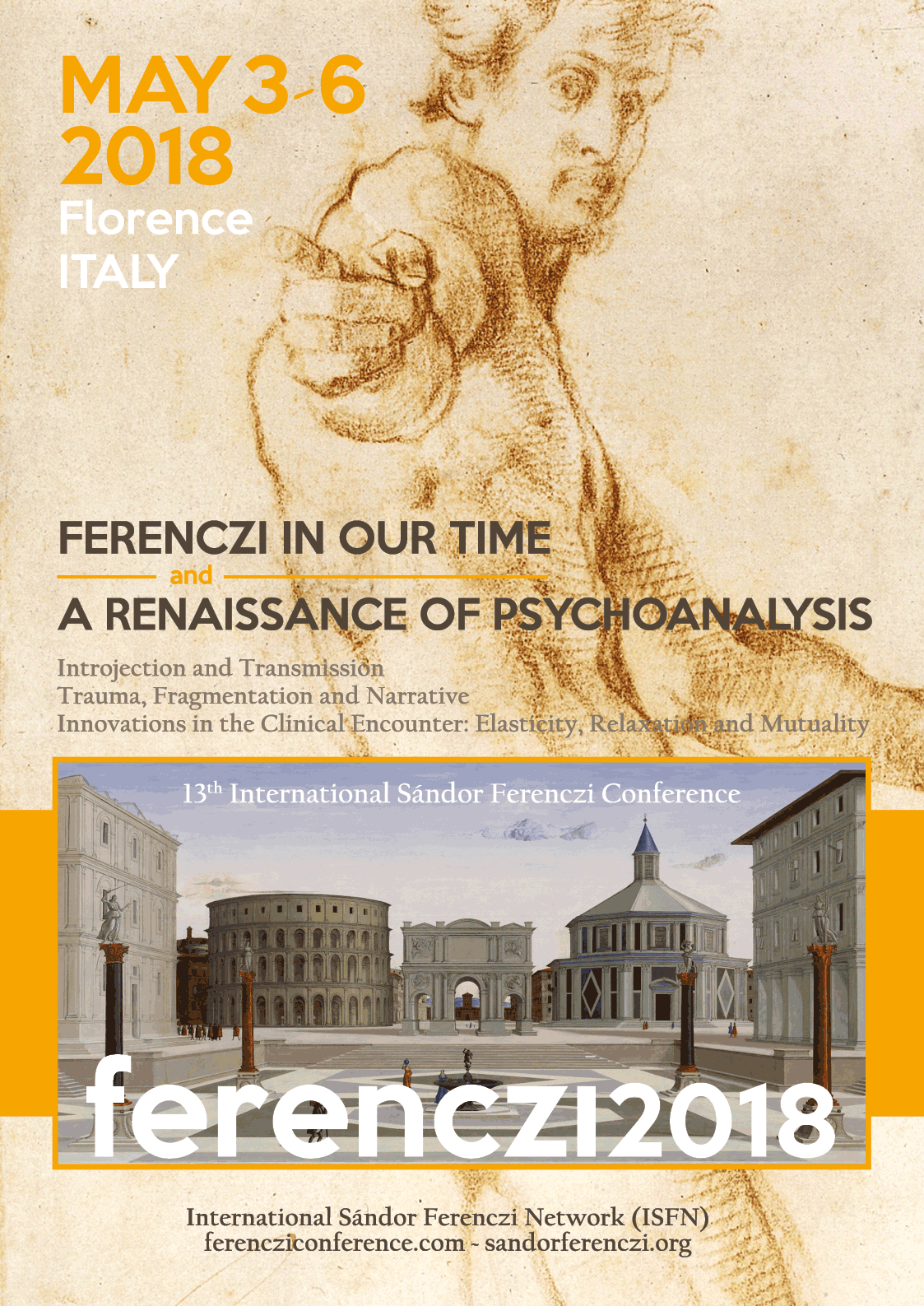

FERENCZI IN OUR TIME AND A RENAISSANCE OF PSYCHOANALYSIS
Florence, Italy, May 3-6, 2018
CALL FOR PAPERS
http://ferencziconference.com/call-for-papers/
Official languages: English, Italian, and Spanish. Submission deadline: Sept. 30, 2017
The International Sándor Ferenczi Network (ISFN) was founded in Toronto on May 7, 2015, as an agreement between societies, study centers, and other institutions, aimed to further the development of psychoanalysis along the lines anticipated by Sándor Ferenczi. Its mission is to be an open forum for providing information, enabling debate, and facilitating research through the ISFN website, and the organization of an International Sándor Ferenczi Conference every three years.
Our Network developed out of 25 years of meetings, exchanges and discussions. We invite all those who find the works of Sándor Ferenczi a source of profound inspiration to become member of ISFN.
https://www.sandorferenczi.org/become-a-member/
Subscribe to the mailing list
https://tinyurl.com/ferenczi2018
Themes of the 13th International Sándor Ferenczi Conference
Introjection and Transmission
In this section, we invite proposals for papers and panels on an important interlocking set of topics, which preoccupied Ferenczi throughout his life as an analyst. Introjection – an early and enduring interest – led Ferenczi (1909) to think about what and how a person takes in the world, particularly the object world, how mind and body are shaped and mutually influenced in encounters with others, as described in his concept of “Dialogues of the Unconscious” (1915). Linked to this cornerstone concept is one centrally important aspect of introjection: the transmission of trauma from other lives, generations, and histories. History leaks across the generations, becoming the often-secret elements in unwitting hosts.
Trauma, Fragmentation and Narrative
Ferenczi’s insights and theory of trauma offered new perspectives in understanding the complexity of the traumatization process. He described the interpersonal, intersubjective and the intrapsychic dimensions of trauma considering environmental events as primarily important in the subsequent cause of psychopathology. Environmental trauma may be manifold: Individual, societal, or cultural. Trauma caused by people against people could be individual (even in smaller or larger communities) or societal (discrimination, migration, war, genocide etc.). Thus, Ferenczi’s conceptualizations on trauma and healing are applicable to discourse in a wider sociopolitical context.
Based on clinical observations, many of them courageously described in his Clinical Diary, Ferenczi recognized different unconscious interpersonal interchanges between the victim and the aggressor such as “identification with the aggressor”, “pleasure principle in trauma” and the “terrorism of suffering”. He also recognized the process of fragmentation and disintegration during trauma and the importance of a “sincere” and “welcoming” therapeutic environment for the working through process after the traumatic experience. When the traumatized person shares his/her experiences with a trusted and receptive person, a healing process is initiated, resulting in fragmented memories becoming integrated into a coherent narrative.
Innovations in the Clinical Encounter: Elasticity, Relaxation and Mutuality
Ferenczi, unlike Freud, was interested in applying psychoanalytic concepts and developing new approaches working analytically with patients weighed down and suffering with significant psychopathology. Throughout his life, Ferenczi was a courageous psychoanalytic researcher and innovator. The results of his researches and ideas arguably were the seeds that grew into what we would consider today as contemporary psychoanalysis. The analysis of countertransference and use of tact (elasticity), the relaxation of standard technique (neutrality and abstinence) in regressed patients, learning from the patient’s experience and field theory (mutuality) were recommendations Ferenczi made almost 90 years ago but have come to be accepted therapeutic approaches in psychoanalytic praxis only in the last few decades. In the spirit of Ferenczi’s research, we welcome clinicians’ submissions, describing their own analytic experiences and innovations.
Submission Guidelines
The ISFN invites psychoanalytic colleagues, trauma specialists, neuroscientists, and academics to submit proposals to be considered in the sessions of the Florence conference. Presenters, as all participants, have to register for the conference.
Abstracts for individual presentations and panels, relevant to one of the three conference themes, may be submitted in either English, Italian or Spanish on the International Sándor Ferenczi Network website.
Abstracts for individual presentations should be maximum 500 words. The presentations should be no longer than 3000 words (20 minutes). The deadline for submissions is Sept 30, 2017.




